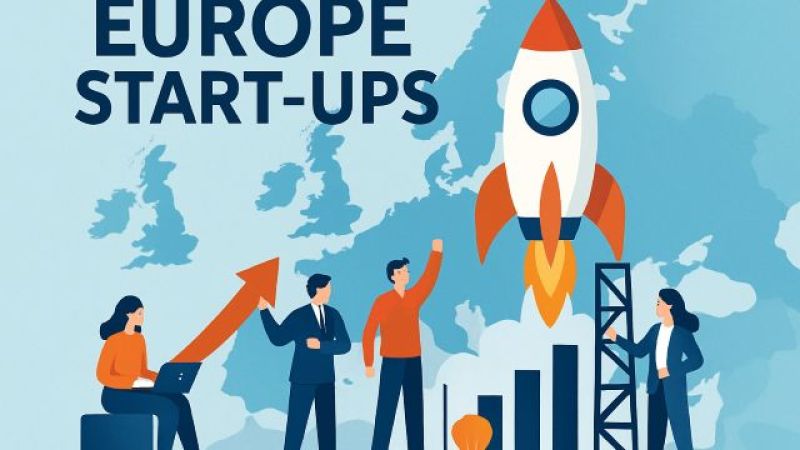Given the financial might of Europe, it might not surprise you that the continent’s startups are thriving. Yet we don’t have to go back far to find a time when this wasn’t the case. Countries varied wildly in how well they supported small businesses, and the goal for many was to move out of Europe, and into the United States.
Making Europe more competitive meant building a proper European startup ecosystem, one which both supports businesses and incentivises them to stay. This has partly been an individual effort by a number of countries—but owes plenty to the EU, its rules, and the various funding schemes and incentives that it provides.
The era of entrepreneurship
The past decade has seen a quiet revolution in the way Europe approaches entrepreneurship. There have always been a handful of economic powerhouses, where big businesses were consolidated. Germany had its automotive businesses, France had its luxury goods, and the UK had the financial sector. But even these economies were somewhat divorced from one another, and the rest of Europe paled in comparison.
Funding has always been redistributed to deprived parts of the EU, but bringing sustainable improvements to countries meant making them more desirable locations for investment. This is something that both the EU and individual countries have achieved with aplomb. The continent is now home to a thriving network of startups driving innovation across every sector; not just in London or Paris, but in a myriad of major cities.
Article: What are the best entrepreneur visas in Europe?
From fintech in Amsterdam, to green energy in Copenhagen, to e-commerce in Tallinn, the European startup network has become increasingly interconnected. Venture capital investment in Europe has reached record highs in recent years, and while still trailing behind the US, the gap is narrowing. Crucially, Europe now produces not just promising startups, but genuine success stories, boasting the likes of Spotify, Revolut, Klarna, and DeepMind.
This isn’t a transformation that happened overnight, but rather one that required effort from both the top-down and bottom-up. While the EU has helped to harmonise laws, regulatory conditions, and funding structures, determined countries have instigated national policies to nurture homegrown entrepreneurs. The result is a European startup ecosystem that is more dynamic, more supportive of talent, and which has realistic global ambitions.
From fragmented to unified
Historically, Europe’s business environment suffered from fragmentation. Each country had its own regulations and tax systems, as well as dozens of different languages, which often made scaling a company beyond national borders a slow and costly process. Even within the EU’s single market, bureaucratic barriers remained, particularly for smaller firms who lacked the legal or financial resources to navigate complex compliance requirements.
Over time, however, this landscape began to shift. The European Commission recognised that if Europe was ever going to compete with the United States and China in innovation and the emerging digital economy, it needed to cultivate a more cohesive European startup ecosystem, one which more closely mimicked the federal policies of a large country. Both digital and physical borders prevented the kind of expansion and growth that the EU wanted to normalise.
Article: How European businesses can compete with Silicon Valley
Introduced as part of the bloc’s Digital Decade strategy, initiatives such as the EU Startup Nations Standard aimed to create common principles across member states, including faster business registration processes, simplified visa pathways for entrepreneurs, and greater access to public procurement. Programmes like Horizon Europe and the European Innovation Council (EIC) meanwhile funnelled billions into supporting innovative companies and research-driven ventures, offering grants and equity investment to help early-stage businesses scale.
These policies have dramatically changed the global perception of the EU as both a business destination and a place to nurture startups. Starting a company in Europe isn’t a limitation, but rather allows entrepreneurs to benefit from a well-regulated, politically stable environment—one that grants access to a vast, wealthy consumer base of over 450 million people.
The French startup renaissance
Nowhere is this transformation more visible than in France. A decade ago, the French business environment was often criticised for its heavy bureaucracy and rigid labour laws, with businesses finding it difficult to scale and to fire employees when needed. Today, Paris stands proudly among Europe’s top startup hubs, rivalling London, Berlin or Amsterdam.
Much of this turnaround can be traced to deliberate government action. Under current President Emmanuel Macron, France has made entrepreneurship central to its economic policy. Initiatives such as La French Tech have helped to brand and promote the country’s startup scene internationally. The programme offers funding, mentorship and networking opportunities for entrepreneurs, while also connecting them with investors and corporate partners from across the world. For more information see our article The French Tech Startup Ecosystem
The results speak for themselves. Paris is now home to Station F—the largest startup campus in the world—and hosts thousands of tech companies, from early-stage innovators to established names like Doctolib, Back Market and BlaBlaCar. The French government’s push for regulatory reform has also made a tangible difference, simplifying some aspects of business registration, and offering tax incentives for investors and startup employees.
Article: Start a Business in France in 8 Steps
The creation of France’s Tech Visa has also made it easier for foreign founders and skilled workers to relocate, further enriching the country’s startup landscape. Along with the general benefits of EU membership, such as freedom of movement for workers, France has cemented its position at the heart of the European startup network, and perhaps the most successful startup destination in Europe.
Germany’s industrial innovation
Germany has also adapted impressively, even if there have been hitches along the way. While the country’s car manufacturers continue to grapple with the transition to EVs, entrepreneurs and startups are picking up the slack, and forging the next generation of corporations. Cities such as Berlin and Munich have become magnets for both local and global talent, with ample funding opportunities and strong startup infrastructure.
Berlin, in particular, has developed a reputation as a creative capital of Europe. The city’s relatively low rents and world class nightlife have made it a melting pot of young talent, including tech startups, artists, and venture capitalists. Government support through the High-Tech Gründerfonds and regional innovation programmes has spurred the growth of young companies in fields from AI and renewable energy to mobility and green tech.
Article: The 5 best cities in Germany to start a business
Meanwhile, Germany’s Mittelstand—its famous network of small and medium-sized enterprises—provides a backbone of businesses who are collaborating with and investing in this new startup class. The country’s blend of technical expertise, financial strength and industrial know-how have helped to make it a natural leader in hardware and engineering-driven startups, providing a new spin on old specialities.
The Netherlands, Estonia and the northern powerhouses
The UK’s exit from the EU has also coincided with the rise of the Netherlands as a key player in the European startup scene. While Amsterdam was already popular for its excellent infrastructure and English-friendly business culture, startups have found homes all across the country. Dutch authorities have invested heavily in fostering innovation through initiatives such as the Startup Visa and the Netherlands Enterprise Agency, both of which make it easier for entrepreneurs to set up and grow.
Estonia, while far smaller, has achieved remarkable success in the past few years thanks to its pioneering digital infrastructure. Often called “Europe’s digital nation”, Estonia’s e-residency programme allows entrepreneurs from anywhere in the world to establish and manage EU-based companies remotely. This has led Tallinn to quickly become a global hub for digital-first startups, particularly in areas such as software, cryptocurrency, and the blockchain. For more information, see our article Why so many people are starting a business in Estonia
In Scandinavia, meanwhile, Sweden and Finland continue to punch above their weight. Stockholm’s vibrant startup culture has produced multiple unicorns, from Spotify to Klarna, while Helsinki’s Slush conference has become a focal point for global investors and innovators. Together, these northern nations are demonstrating that openness, digital readiness, and a strong backbone of startup and digital infrastructure can all drive genuine economic transformation.
A sustainable future for innovation
One of the defining features of the modern European startup ecosystem is its growing focus on sustainability and social responsibility. European entrepreneurs are leading the way in climate tech, circular economy initiatives, and green energy. This reflects both regulatory pressure—through EU Green Deal policies—and a cultural shift among younger generations of founders and consumers who see business as a force for good.
Across Europe, funding is increasingly being channelled into startups tackling environmental and social challenges. Programmes such as InvestEU and the Innovation Fund are helping to support ventures that align with the bloc’s green and digital transitions. As a result, Europe’s startup network is not only becoming more dynamic but also more purpose-driven, creating long-term value rather than short-term profit.
Despite the progress, however, there are still challenges the EU needs to overcome. Access to late-stage funding is still more limited in Europe than in the US, with fewer large-scale venture capital firms capable of supporting ‘unicorns’ (billion euro companies) to expand globally. Some markets still have complex bureaucracy, and the regulatory diversity between EU and non-EU countries within Europe can still slow down growth across borders.
Still, the direction of travel is clear. While the EU continues to push for greater harmonisation of business rules and digital infrastructure, its nations are increasingly focussed on supporting innovation. With further coordination on business policies and ongoing investment in research, education, and infrastructure, Europe’s startup ecosystem is well-positioned to thrive in the years ahead.
The story of the European startup network is one of reinvention. From a fragmented patchwork of local initiatives, Europe has built a coherent, world-class ecosystem that supports innovation at every stage. Entrepreneurs now benefit from easier access to funding, more supportive regulation, and a shared sense of purpose across the continent.
Founders who would once leave for Silicon Valley as soon as their startups reached a certain size are increasingly staying put, and attracting investors and talent back to Europe. The future of the European startup ecosystem is bright, and it isn’t just one city or country that’s shining—it’s an ecosystem that’s lighting up the whole of Europe. For more information on opening a company in Europe, feel free to download our free guides below.





